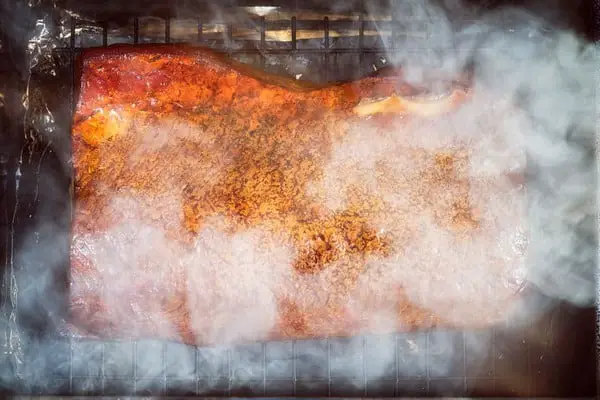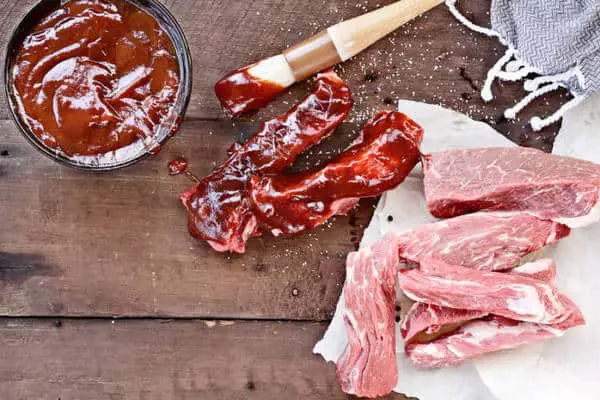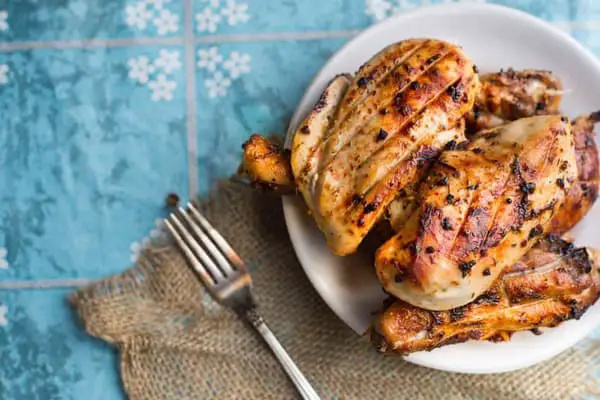
Grilled meat looks great and is appealing to the nose as well as to the palates. However, a growing body of evidence suggests that grilled red meats are associated with a higher risk of cancer.
With such a fuss around grilled red meat, you may be pondering whether or not the barbequed grilled chicken is a better and healthier alternative.
What Experts Say: Is BBQ Grilled Chicken Healthy?
The short answer is that barbeque grilled chicken is healthy, and, there are three main explanations for this:
First, chicken is a type of white meat meaning it has relatively lower levels of saturated fats and calories compared to red meats.
Secondly, despite having lower fats and calories, BBQ chicken is rich in proteins, vitamins, and minerals making it just as nutritionally beneficial as grilled red meat. For example, the niacin and vitamin B6 found in grilled chicken can reduce one’s risk of heart disease.
Thirdly, grilling is a potentially healthier way of cooking chicken than baking and frying. One reason for this is that grilling melts away chicken fat leaving it with lower fat content. Another reason is that some of the other methods of cooking chicken use added oils and sugars. These additives end up increasing calories and cholesterol levels in the chicken making it unhealthier.
Not a Black and White Issue
However, the issue of whether BBQ grilled chicken is healthy or not is not a black and white matter. The truth is that grilling chicken also comes with potential hazards. In fact, the manner in which you prepare, grill and even serve your chicken can determine how healthy it is.
Read on to understand more about the risks associated with barbequing chicken and get tips on how to keep the grilling process as healthy as possible.
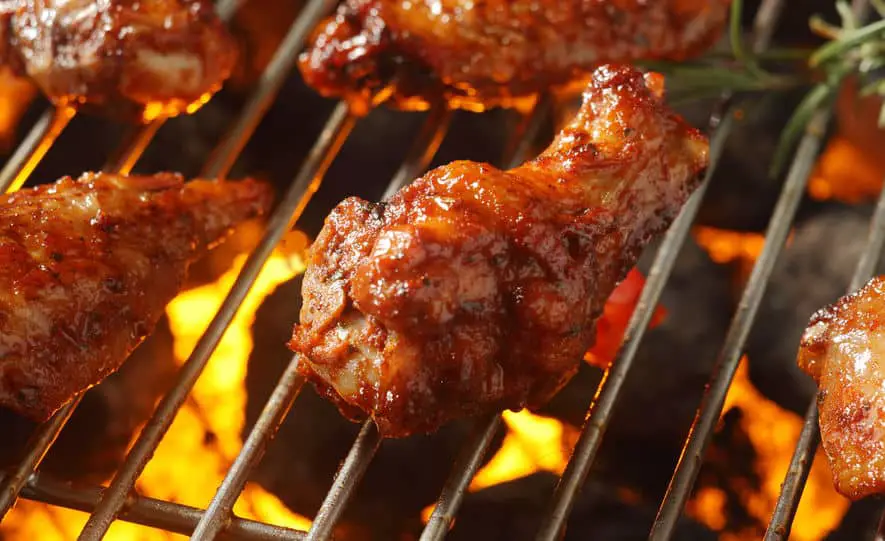
Potential Risks of BBQ Grilled Chicken
Yes, BBQ chicken is flavorsome. However, it is not entirely safe. Science suggests that grilling chicken may increase one’s risk of consuming carcinogens. Carcinogens are basically substances that have the potential of causing cancer. Grilled chicken may lead to the formation of two main types of cancer-causing agents: heterocyclic amines (HCAs) and polycyclic aromatic hydrocarbons (PAHs). Animal studies suggest that both agents are mutagenic, meaning that they can significantly alter DNA, which increases the risk of cancer.
The National Cancer Institute (NCI) notes that HCAs form when meat is cooked using high-heat methods such as grilling, frying and broiling. Notably, HCAs can form in red meats such as beef as well as white meats such as chicken and other poultry. HCAs form when amino acids (compounds which proteins are made of), creatine and sugar combine and react together at high temperatures. It is worth noting that HCA yield is higher when meat is overcooked or charred.
PAHs are also formed when meat is directly cooked over a fire or other heated surface. These carcinogens form when fats and other juices from the meat drip onto the heated surface or flame. Due to the high temperatures these drippings do not burn completely and as a result, they produce PAHs which are present in the resultant smoke. Since the meat is cooked over the fire or heated surface, the PAHs stick onto the meat and are, therefore, ingested together with the meat.
Interestingly, there are no conclusive studies on the link between the HCAs and PAHs found in cooked meat and the development of cancer in humans. Nevertheless, some studies suggest that prolonged exposure to these compounds may increase the risk of contracting stomach, colorectal, pancreatic, and even kidney cancers. Even then the degree of risk varies from one individual since different bodies react differently to the compounds. Research also suggests that regularly eating well-grilled chicken can lead to high blood pressure.
Some studies also suggest that over-grilling meats such as chicken can also lead to the formation of advanced glycation end products (AGEs). These compounds can cause inflammation as well as potentially worsen conditions such as diabetes, Alzheimer’s disease and chronic kidney disease.
To Barbeque or Not to Barbeque
While research suggests that grilling chicken poses some significant health risks, the truth is that findings are unconvincing. Indeed, many experts are not sure whether the health risks associated with barbeques are as a result of the grilling or the type of food e.g. processed and unprocessed meats. In short, there are too many unknowns in the grilled chicken debate to make any conclusive judgments on its safety.
The most important thing for barbeque enthusiasts is to have information on the potential benefits of grilled chicken as well as its potential pitfalls. It is then up to you as an individual to make an informed choice on whether or not to barbeque your chicken.
One undeniable fact is that grilling is one of the quickest and easiest ways to cook a delicious chicken meal. However, there is also no doubt that grilling chicken results in the formation of compounds which negatively impact the health and safety of the meat.
How to Reduce the Dangers of Grilling Chicken
Fortunately, experts have identified a number of tips and guidelines which can help to mitigate the risks associated with grilling chicken.

- Thaw and/or Pre-cook the chicken
When barbequing chicken that was in the freezer, it is important to let it thaw at room temperature for at least 30 minutes before grilling it. Thawing ensures that the temperature around the whole chicken is even which in turn increases the chances of the chicken cooking evenly on the grill.
In some cases, especially when grilling large cuts, it is also advisable to pre-cook the chicken. Pre-cooking in a microwave or oven goes a long way in reducing the amount of time that the meat needs to sit on the grill. In the end, this means lower production of carcinogens like HCA and PAH.
- Skewer the chicken
Another strategy to reduce the amount of time chicken cooks on the grill is to skewer it. Skewering simply means cutting up the chicken into smaller pieces. Generally, smaller pieces of meat take a shorter time to cook meaning that they do not sit for too long on the grill. Again, this strategy reduces HCA and PAH formation.
- Marinate the chicken
Marinating is a process that seeks to add flavor to foods even before they are cooked. When it comes to grilling, marinating can also serve as a mitigation measure against the risks associated with barbequed meats. Empirical research shows that soaking meat for up to an hour in a marinade could reduce the production of AGEs by up to 50%. Additionally, marinating could also reduce the production of HCAs by over 90%.
When marinating your chicken it is advisable to:
- Use a marinade that contains olive or canola oil
- Use a marinade that contains an acid such as vinegar or lemon juice
- Refrigerate the chicken as it marinates
- Set aside fresh marinade for the purposes of basting the chicken (rather than using the marinade that the meat was soaking in)
- Marinate for at least an hour
- Utilize herbs and spices
Another way to add flavor to your chicken is to use herbs and spices in the marinade and cover the meat. According to some studies, spices and herbs such as black pepper, chili powder, and rosemary can also help limit HCAs’ production. This is because many of these herbs and spices contain high levels of protective antioxidants.
As a matter of fact, it is advisable to use natural herbs and spices over packaged barbeque sauces when grilling. This is because bottled sauces contain high amounts of artificial coloring, preservatives and fructose. All of these substances can increase the production of HCA.
Regularly flip the chicken
When grilling chicken, it is important to flip it regularly and consistently rather than letting it sit on one side for too long. Letting chicken cuts sit on the grill for too long without flipping them results in charing which in turn influences the formation of HCAs. Flipping regularly also ensures that the meat cooks evenly. However, it is also vital to ensure that you flip the chicken in a gentle and non-piercing manner. Piercing the meat only releases juices which drip onto the fire and lead to the formation of PAH.
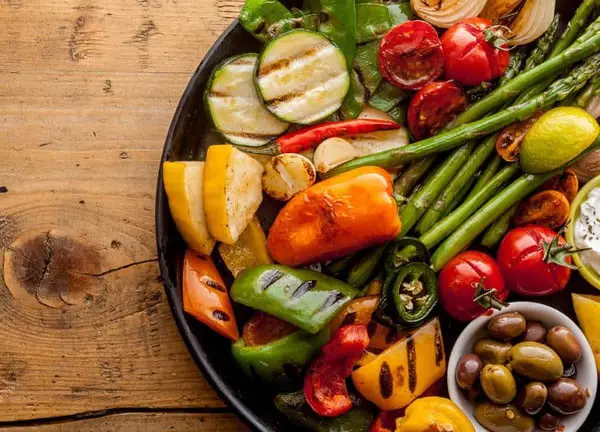
Incorporate vegetables in the grilling process
Incorporating fruits and vegetables in the grilling process can help to enhance the taste and healthiness of barbequed chicken. Of interest to note is that grilling fruits and vegetables does not result in the formation of compounds like HCA and PAH. On the contrary, vegetables and fruits contain antioxidants which limit the production of these carcinogens. Fruits that go really well with grilled chicken include pineapples, mangoes, and watermelons.
Avoid processed meats and stick with lean cuts
One of the simplest ways to whip up a healthy chicken barbeque meal is to avoid processed chicken. Processed meats are those which have undergone processes such as curing and chemical preservation. Studies associate processed meat with greater risks of cancer and other chronic diseases.
Along the same line, it is advisable to stick to lean chicken cuts. Lean cuts generally contain lower amounts of saturated fat and cholesterol than normal cuts. However, lean cuts also tend to cost higher. An alternative is to trim the skin before grilling the chicken. Trimming the skin reduces the fat content of the chicken, making it healthier. Skinning the chicken also reduces the possibility of fat dripping onto the grill hence limiting PAH formation.
Notably, chicken breasts are leaner than chicken thighs and legs. Chicken breasts also contain more protein than chicken thighs and legs making them ideal for healthy grilling.
Use beer to marinate
According to a study published in 2014, adding beer to a marinade can help to minimize the formation of carcinogenic PAHs. The study specifically established that marinating meat in a marinade containing dark beer could cut the production of 8 different types of PAHs by almost 70%. Although dark beer was the most effective, light beers and wine were also found to reduce PAH production.
Use healthier buns
Grilled chicken sandwiches are America’s second most popular types of sandwiches. Instead of using white bread buns, it is prudent to use whole-grain buns in making the sandwiches. White bread is associated with higher risks of obesity, diabetes and heart disease among other conditions. In contrast, consumption of whole-grain bread is associated with lower risks of diabetes, heart disease and even some types of cancer. Simply put, whole grain bread will make your grilled chicken sandwich healthier and more wholesome.
Use grill mats or wrap the meat up
One of the main concerns around barbequing chicken is the fact that the meat comes into direct contact with the flame and the metal grill. However, we already know that cooking meat over direct heat results in the production of potentially harmful carcinogens. A simple remedy for this is to use a grill mat to prevent the chicken from coming into direct contact with the heat. An alternative strategy that works just as well is to wrap up the chicken cuts in foil when grilling them.
Use a meat thermometer
The dangers of grilled chicken are do not only revolve around carcinogens. It is quite possible to contract a foodborne disease from eating meat that is not well cooked. An effective way around this risk is to use a meat thermometer to ensure that your chicken is well grilled before eating it. According to the United States Department of Agriculture, poultry meats should cook up until they achieve an internal temperature of at least 165 °F.
Use Hardwoods instead of softwoods
Different types of wood burn differently and at different temperatures. Hardwoods normally burn slower and at lower temperatures than softwoods. Grilling chicken over hardwoods such as maple, oak or hickory may lead to lower production of HCAs and enhance the health and safety of barbeque chicken.
Removed charred parts
Yet another simple strategy to keep barbeque grilled chicken healthy is to remove and discard all charred parts before consuming the meat. Keep in mind that charred parts most likely contain carcinogenic compounds, increasing the risk of cancer when ingested.
Conclusion
In conclusion, barbeque chicken is clearly a good source of proteins, vitamins, and other nutrients that the body needs. It is also clear that grilled chicken is a healthier alternative to grilled red meats due to the lower calories and saturated fats. Even then, it is advisable to enjoy barbeque grilled chicken in moderation.
Additionally, barbeque aficionados should remember to follow the healthy-grilling tips in order to minimize the pitfalls associated with cooking chicken over the grill. Last but not least, it is important to remember that an imbalanced diet is more likely to hurt your health than grilled chicken.

